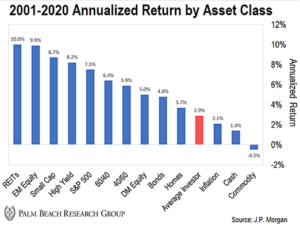Bits and Pieces
Can You Beat the Market?
The last 20 years have been good for investors in REITs (10%), decent for anyone that invested in index funds (7.5%), and satisfactory for risk-averse investors that put their savings in bonds (5%).
But individual investors – people that try to beat the market by buying and selling individual stocks – did poorly over those two decades. As you can see in the chart below, they made a paltry 2.9%, or just 1% after inflation.

This is not necessarily an argument against individual investing. I know at least a dozen investment analysts that have beaten the stock market substantially for many years. They work for AP, my #1 client.
Subscribers that consistently follow their recommendations do very well – outpacing the markets along with the analyst. But many investors – people that subscribe and pay for that same advice – can’t hold themselves to stay with the program. When market prices drop precipitously, they get scared and sell, even when the analyst tells them to hold. And then, when the market begins to turn around and move back up, they wait too long to get back in.
What’s the answer?
If you have the emotional intelligence to be happy with historic returns for stocks and bonds, and the emotional strength to ignore market fluctuations, buy index funds for the long term – i.e., at least 10, but preferably 20+ years. If you do, you can expect to get an ROI of about 9% to 10% on your stocks and 4% to 4.5% on your bonds.
If investing in an index fund is just too boring for you, find an analyst with a good long-term track record and stick with him.
If – despite knowing better – you intend to game the market, to buy and sell individual stocks based on your own research and your best instincts, do so with only 20% of your investible net worth. Put the rest in index funds.
GOOD: Ultra-Cool Celebrities Opting Out
The great thing about name-and-blame culture is that, however destructive it is, it self-destructs. Like an auto-immune disease, blamers eventually loses the ability to distinguish between what’s good and what’s bad. That’s what’s happening now with Woke Culture. Celebrities, the vanguard of the movement, are being cancelled and are opting out.
BAD: The FBI Takes a Pass on Investigating the Attack on Larry Elder
The unbelievably racist attack on conservative author and former candidate for California governor Larry Elder has been successfully swept under the rug. The mainstream media did its best to ignore it.
Click here.
QUESTIONABLE: If Voter ID Laws Are Racist, What Else Is?
This won’t convince you if you believe voter ID laws are systemically racist. But it should.
Click here.
The Action at Art Basel Is Still Strong; This Bodes Well for the Industry
The nouveaux riches are still buying art.
Art Basel, as you probably know, is the biggest and most important modern and contemporary art fair in the world. This year, because of the pandemic, sales were expected to be modest. But galleries in attendance in Switzerland are reporting some very impressive sales.
A few examples…
White Cube gallery sold a 2006 Mark Bradford work (Kryptonite) for $4.95 million:

Gladstone Gallery sold a 1982 untitled painting by Keith Haring for $5.5 million:

Hauser & Wirth sold a 1975 painting by Philip Guston for a record-breaking $6.5 million:

And Thaddaeus Ropac sold a 1984 Robert Rauschenberg piece on canvas, titled Rollings (Salvage) for $4.5 million:

This is encouraging.
Art Basel is known primarily for featuring up-and-coming contemporary artists. Thus, it doesn’t surprise me that Mark Bradford, who is super-hot right now, is getting these crazy prices.
But when works of established (and even dead) artists like Rauschenberg, Guston, and Haring are selling for $5 million+ more than 30 years after they were created, that’s a good sign for anyone that collected them early. Their values are all but locked down.
In Case You Were Wondering: “everyday” vs. “every day”
* Everyday is an adjective, as in, “The sirens were now an everyday occurrence.”
* Every day is an adverbial phrase, as in, “I hear sirens every day.”
Got it?
Fossil Fuels Are Not Going Away
“Much of the media makes it sound as if [renewable energy is] on the verge of taking over, but that’s far from reality.” So says Bjorn Lomborg, author of False Alarm: How Climate Change Panic Costs Us Trillions, Hurts the Poor, and Fails to Fix the Planet.
Why?
* Though the headlines constantly trumpet the future of solar and wind, Lomborg points out that these renewables produce mostly electricity. And electricity is only 19% of the energy the world consumes. The rest is used for heating, transportation, and the production of things like steel and fertilizer. So even if all electricity were green, the world would still run on fossil fuels.
* Renewables are often touted as the cheapest energy source, but this is only true when the sun is shining and the wind is blowing. On many nights, you still need backup power, which typically comes from fossil fuels.
* Cutting fossil fuels as quickly as environmentalists would like will be very difficult. In 1970, about 86% of the energy used in the world came from fossil fuels. Twenty years later, thanks to nuclear energy, that number was down to about 81%. China’s expansion in the first decade of this century boosted fossil fuel consumption by about two degrees. And then, when solar and wind kicked in around 2015, the number went down to 81% again. Which is where it stands today.
* In 2020, pandemic lockdowns forced the world to cut carbon emissions significantly. If all countries deliver on the Paris Climate Accords, we will be down to 73% by 2040. But to make that happen, global emissions would have to plunge even further every year for the rest of the decade. In 2021, they would have to drop by more than double the lockdown-induced decline. By the end of 2030, they’d have to have fallen by 11 times what they did in 2020.
As Lomborg says, “Not exactly realistic.”
3 Words I’m Trying to Work Into My Conversations
* jeremiad: a prolonged lament or an angry harangue
* cynosure: an object of attention
* gormless: stupid
Test Yourself : How well do you know the languages of the world?
Being that this quiz was on languages, an interest of mine, I was hoping to get a perfect score. And I started strong. But I faltered towards the end.
Click here to take the quiz.
And in case you get all your news from CNN and the NYT…
If you do a Google search, you’ll find numerous 2020 postings (including a Wikipedia entry) calling “news” of Hunter Biden’s recovered computer files fake. But the conservative media has kept digging – and what they are finding doesn’t look good for Hunter.
Let’s see how it plays out.
Michael Masterson Says…
“It’s been said that childhood hurts never go away. That may be true, but some of them, like mended bones, make us stronger.”
